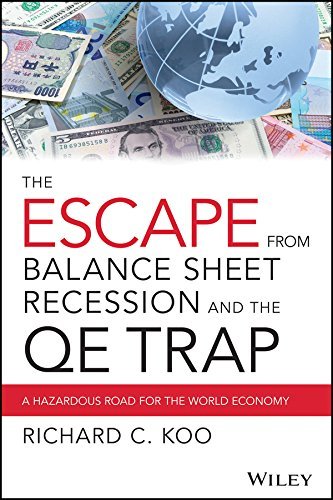
Debt-reduction, if done too aggressively and widely, is the source of economic malaise. This has been the case in Japan since 1989, resulting in what Richard Koo, an HK economist based in Tokyo, called “balance sheet recession.” In a sense, it is an attempt to overcome the glut of any economic acquisitions in the past thirty to forty years.
What is unique about Richard Koo’s analysis is its applicability to the sub-prime mortgage crisis in 2007-2008. When banks realized they had over-extended their loans to various classes of consumers, they resorted to slicing and dicing the mortgages into various small bits. They then sold these loans to smaller companies down the food chain, creating a massive deluge of defaults when these consumers could not afford to pay off their loans as the economy remained weak.
What the Obama administration, and the European Union did, was precisely what Japan had done previously, occasionally by spending up to 30 trillion yen a year, to keep the Japanese currency afloat and economic activities stable. But, as with any balance-sheet recession, any amount of money that goes into the system, will be used to bring down the debt, not to stimulate actual consumption.
Banks will gain from QE, and always will. But consumers will not necessarily gain from the banks’ survival. In fact, consumers may even grow to hate the banks that are too “big to fail,” and to “jail.” The Occupy Wall Street Movement was one such outcome of the QE liquidity policy.
Had the West learned from Japan, sub-prime mortgages could have been avoided in its entirety, according to Richard Koo, from Nomura Securities. But the West was too self-absorbed with its own economies to even notice that Japan’s economic problems were the same as theirs. A dearth of Western economic correspondents in Japan between late 1990s and 2000, also put paid to any policy lessons that could have been learned from Japan, since these well-informed economic journalists, writing in English and their respective languages, would have warned central bankers and policymakers in the West.
Without these journalists to echo the views of Japan, primarily the warning of Richard Koo, who received his Ph.D. in Economics from the University of Tokyo, and who was, at one stage the Ph.D. fellow in the Federal Reserve Bank of the US in the early 1970s, the whole information signaling system fell apart.
The latter is an interesting observation, since globalization has generally described the world as a very tight and delicate place. What occurs in one corner of the world will have immediate repercussion in another world.
But, from the vantage point of Richard Koo, this was not necessarily the case, since Japan was considered a developed economy with various “structural problems,” that the seemingly superior West was not deemed to have had.
It is this ethno-centric bias for and against Japan that makes central bankers and leaders in the West blind to the similarities of Japan viz the West. Whether this notion is fair or not is of course subject to the evidence. But from the research of Richard Koo, his view does hold out.
First of all, interest rates in the West have reached the same zero levels as Japan, with nary any economic recovery that is strong and sustainable.
Secondly, no amount of money pumped into the international system has been able to raise the income level of various countries. Indeed, wages have remained stagnant for almost two decades, whether in the West or Japan; even Singapore.
Three, and more importantly, Japan and the West have struggled to get their central banks to re-float the economies, not just over several years, but over more than a decade. In this sense, the argument of Richard Koo ought to be given more weight than is otherwise the case. The issue is, will anyone listen to a Hong Kong economist from Japan? Without the ability to listen, to describe all the economic malaise in the West, as a “balance sheet recession,” a total and absolute escape seems impossible. What the West is doing via numerous QEs is but an attempt to kick the can down the road.
It is also what elected politicians, with short electoral cycles, do. Everyone wants to transfer the problem forward, to escape the scrutiny of their own tenure in office. Such efforts be-speak the flaws of the democratic systems.
So, if and when China, for example, is hit with the same “balance sheet recession,” will Beijing be able to respond by also learning from Japan? The likelihood here, again, is not strong, even though Richard Koo is technically a Chinese. After all, given all the economic growth of China in recent decades, why is there a need for Beijing to learn from Japan?
